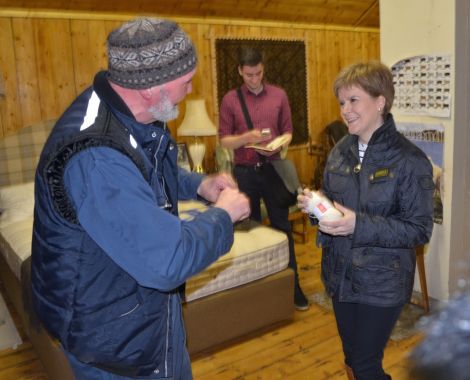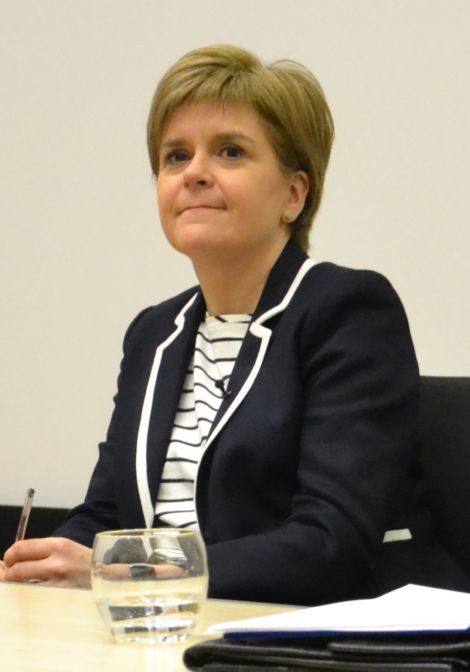Politics / Sturgeon: SNP will find way to cut ferry fares
NICOLA Sturgeon used a Q&A session in front of a packed Shetland Museum auditorium on Monday night to insist the SNP recognises the need for action to bring Shetlanders’ ferry fares down.
Having faced criticism from Liberal Democrat Tavish Scott and protest group Wir Shetland for cutting fares on West Coast routes but failing to take similar action in the Northern Isles, Sturgeon said the SNP was committed to finding a solution that puts “downward pressure” on fares.
Scotland’s First Minister said that if the “road equivalent tariff” (RET) model was applied here it risked putting fares up on some routes, and that is why the SNP – in power for the last nine years – has been slower to act in Shetland and Orkney.
At present Shetland Islands Council subsidises the cost of running ferries to the tune of more than £6 million a year, and is also expected to pick up the tab for replacing ferries – unlike west coast routes directly funded by Transport Scotland.
Talks have been ongoing for a while, and some sources had expected a firmer offer from the SNP prior to the election.
“We’ve made clear we’re open to discussion with the council about the Scottish Government taking over responsibility for inter-island ferries similar to what happens in the west of the country,” Sturgeon told Shetland News earlier on Monday.
In terms of the NorthLink contract, currently in Serco’s hands and up for renewal in 2018, she wants to work in partnership with local councils to “ensure it meets the need to see fares going down” and “deal with what some people see as an unfairness”.
“In terms of NorthLink ferries, whenever I visit the Northern Isles people make the case for RET,” she said. “If you were to introduce RET for Shetland right now the likelihood is it would lead to an increase in ferry fares, which is why we haven’t done that.
Become a member of Shetland News
“That’s obviously not what anybody wants to see, but again we are very open to discussions about how we make sure ferry fares are affordable and accessible to people.”
Warm welcome from SNP supporters at packed museum
Monday night’s talk and Q&A session at the museum followed a day-long visit in which the SNP contingent – including islands minister Derek Mackay – acquainted themselves with ponies and enjoyed tours of Lerwick Brewery and Jamieson & Smith wool brokers, before opening the party’s campaign HQ in Lerwick’s Bank Lane.
Sturgeon and Mackay were in Shetland to support of local candidate Danus Skene, who is not long out of hospital following surgery.
Her last speech in the same room in August 2014 had taken place at the height of tensions during the independence referendum campaign.
While the atmosphere was less fervent this time, it was again standing room only – testifying to a magnetic appeal no other politician at Holyrood enjoys – and supporters afforded her another warm Shetland welcome.
In his opening remarks, Skene said the SNP stood for fairness and had done its best to protect Shetland from the “nastier aspects” of what he views as “Tory class warfare” at a UK level.
Skene said he shared the aspirations of many who want greater autonomy for Shetland and said the most practical way of achieving that was by working with an SNP government whose “door is wide open”.
Sturgeon is seeking election as First Minister for the first time, 16 months after replacing Alex Salmond in the wake of losing the referendum.
Despite polls giving the SNP a colossal lead over Labour in the constituency vote, she told supporters she was “taking nothing for granted”.
The party’s top priority is ensuring the NHS is “fit for the future” and she wants to “invest in, reform and reshape the way it delivers care”.
On education, Sturgeon has talked frequently of addressing the “stubborn and far too big gap” in performance between Scotland’s most and least affluent pupils, while the SNP has vowed to keep university education “free based on ability to learn”.
A renewed nationalist administration would also use its new powers to abolish the Tories’ bedroom tax and would steer clear of cutting disability benefits.
‘Why on earth would any of us have a plot to do down Shetland?’
The SIC faced a bigger-than-expected £5 million funding cut for 2016/17 – leading to accusations that it had been handed a raw deal by the SNP.
But responding to a question from a stray Wir Shetland member – the campaign group was boycotting her visit – Sturgeon said council funding was allocated using a formula agreed with local government umbrella body COSLA, and not “unilaterally” decided by ministers.
“Why on earth would any of us have a plot to do down Shetland?” she asked. “It is not true. The determination of me and the government to work with the council and communities in Shetland is sincere.”
Topics raised during the Q&A ranged from concerns about the named person scheme to the reliably divisive Viking Energy windfarm.
Sturgeon said the SNP was “pushing very hard” for an interconnector to unlock Shetland’s green energy potential, but the UK government’s approach was “damaging renewables” throughout the country.
One questioner raised a chuckle by recommending to Sturgeon that future upgrades to broadband infrastructure should “geographically start at the top”.
Speaking during her afternoon visit to the wool broker’s, Sturgeon said she wanted the UK to remain within the European Union following June’s in/out referendum in spite of the Brussels project’s shortcomings.
She sympathised with the local fishing industry’s frustrations with the EU and wants to see greater “regionalisation” and a different approach to the common fisheries policy.
“We’re not for a second saying that Europe should stay as it is in every respect,” Sturgeon said.
“I think particularly when it comes to fishing there are big arguments for change, but I still think that overall, the economic, the social, the cultural arguments, we’re better off on balance being in rather than out of Europe.”
Exactly a year on from the so-called “Frenchgate” memo affair that nearly cost Northern Isles MP Alistair Carmichael his seat, Sturgeon said it was “for islanders to decide” whether that episode influences the forthcoming elections in Shetland and Orkney.
“We’ve got two fantastic candidates, Danus Skene here and Donna Heddle in Orkney, so I think they’ll make their own case, and it’ll be a positive case about what they can do for the islands.
“It’s for opposition politicians to argue their own case, and for people to make their own judgements.”
It would be wrong to raise basic rate of income tax
What of recent suggestions that the SNP manifesto was too timid on taxation? Many have identified similarities between Sturgeon’s rhetoric in ruling out restoring the upper rate of income tax to 50p and George Osborne’s justification for getting rid of it.
Sturgeon said the SNP was asking people in the top 10 per cent of earners to “shoulder more of the burden – we won’t pass on a tax cut that George Osborne has planned, and that will allow us to spend over a billion pounds extra in the next parliament on public services”.
“But I don’t think it’s right to increase the basic rate of income tax at a time when many people on low incomes are still struggling, and the plans Labour and the Liberals have put forward would [do that].”
The SNP recently lifted its nine-year council tax freeze and said it would raise rates for higher value properties, but again faced accusations that its reforms were too tame.
Skene himself said he looked forward to making the case for bolder change, scrapping council tax and replacing it with a more progressive local income tax.
Sturgeon said that, as the Scottish Parliament took responsibility for income tax, the SNP would “assign a share of income tax revenues to local authorities, so the funding becomes much more closely related to income and becomes, overall, more progressive”.
Become a member of Shetland News
Shetland News is asking its readers to consider paying for membership to get additional perks:
- Removal of third-party ads;
- Bookmark posts to read later;
- Exclusive curated weekly newsletter;
- Hide membership messages;
- Comments open for discussion.
If you appreciate what we do and feel strongly about impartial local journalism, then please become a member of Shetland News by either making a single payment, or setting up a monthly, quarterly or yearly subscription.






























































